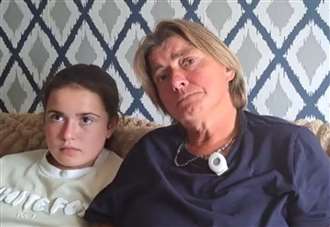A mum left partly paralysed since childhood has been refused extra help from the government to buy a mobility scooter.
Joelean Burns, from Faversham, had applied to the Department for Work and Pensions (DWP) for an enhanced Personal Independence Payment (PIP) allowance so she could purchase the vehicle, expected to cost at least £3,000.

But her request was turned down, despite her worsening mobility caused by arthritis in her hips and knees.
“I’m having to fight for everything,” the 49-year-old told KentOnline.
“All I wanted was some help. I can’t use one side of my body. I’m struggling as it is. I feel like I’m losing my independence as I need people around me because I can’t do things on my own. I’m in pain when I walk.”
Ms Burns has been paralysed on the right side of her body since suffering a stroke at the age of eight.
Until recently, she used an adult-sized tricycle to get around, but her condition means she can no longer use that, particularly it is too large to take inside shops.

Now dependent on others for daily tasks, she says a mobility scooter would restore some of the freedom she’s lost.
Her 10-year-old daughter Marlee now helps with housework, including cooking and washing up, while friends and neighbours do the shopping.
When our reporter visited Ms Burns, she was clearly in significant pain simply walking down her front path – even while using a railing – and was unable to stand for long without discomfort.
The DWP assessed her case but concluded she did not qualify for the extra support, saying she could still walk between 20 and 50 metres with the help of a stick and was able to use public transport.
Her claim was awarded 10 points under the mobility criteria – two short of the 12 needed to access the higher-rate payment.
In response, a friend, Lisa McClean, set up a GoFundMe campaign to raise the money privately. Within a week, it had received £2,105 through 98 donations.
“I want Joelean to be able to have her independence back, so she can go out and be able to do her own shopping,” said Ms McClean.
“It’s upsetting that the DWP haven’t helped her even though they can clearly see that she has got disabilities.”
Ms Burns said: “I am overwhelmed by the amount of support and love that’s been shown over the last few days.
“Things are getting harder for me; that’s why I thought if I had a bit of mobility, it would make life just a little bit easier for me.”


The DWP did not comment directly on Ms Burns’ case.
A spokesperson said in a statement: “We are changing the social security system so it helps people to live with dignity.
“This means genuinely supporting those who can work into employment and ensuring the safety net will always be there for the most vulnerable.
“We have also announced a ministerial review of the PIP assessment process -which puts disabled people at its heart – to make sure it is fit and fair for the future.”
Earlier this year, the government’s plans to cut PIP sparked a huge backlash among Labour MPs, resulting in a partial U-turn, meaning current recipients are shielded from any changes.

Ms Burns’ stroke happened in 1984 as she waited with her family for the Faversham Carnival to begin. She suddenly tilted to one side and collapsed.
Her life was saved by a six-hour operation to bypass a blood clot on her brain. Then a pupil at Davington Primary School, she worked hard to recover her speech and mobility in the months that followed.
In later years, she became a lollipop lady and dinner supervisor at the school, and also worked as a youth worker at the former Faversham Youth Centre, but she is no longer physically well enough to work.
Her daughter Marlee was born when Ms Burns was 38 – exactly 30 years after the stroke – and was described as a miracle baby, as doctors had said the damage caused by the stroke meant she would never be able to have children.
